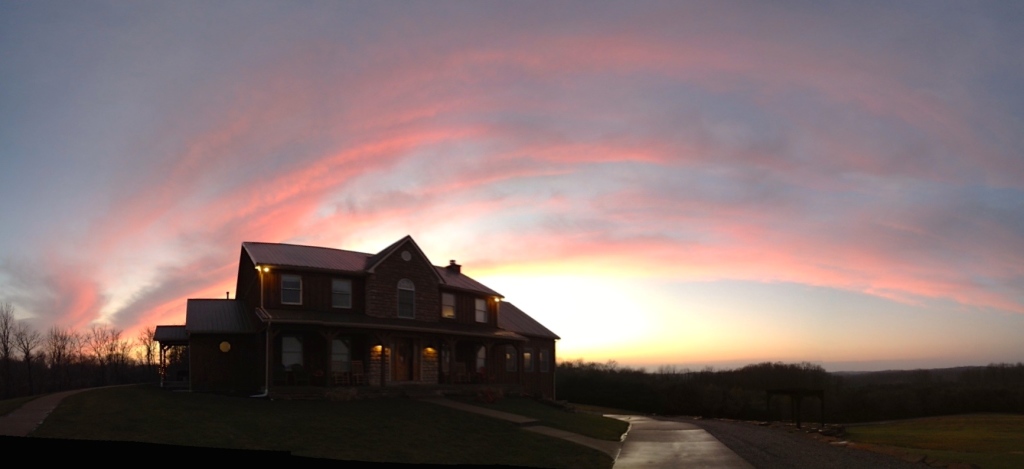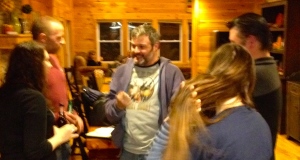

Our trek to the Bourbon Ridge Retreat was itself a writing prompt. Elsa’s cell phone got us to end of the highway before reception cut out completely. We had to resort to printed instructions, ones made difficult to read by the encroaching nightfall. A gentle fog rolled in on cue as we drove winding roads with whimsical names like “Clay Lick” and “Honey Goat Run.” The stray rays of our headlights illuminated signposts to ominously wholesome diversions, the wreckage of ancient barns, and the glowing eyes of creatures we took to be deer but perhaps were, in fact, these legendary “honey goats.” At one point, our car was pointed down a steep, weed-shrouded drive, nose to nose with a hand lettered sign “Posted: Absolutely NO Trespassers.” I wanted to take a photo but Elsa spun wheels in reverse. Eventually, we found the luxurious lodge and a warm welcome.

Raw Dog Screaming Press publishes high quality work across many genres, taking delight especially in works that cross and confound genre expectations. From some of the best bizarro to horror poetry to hyper-real dark literary and beyond, RDSP produces lovely volumes of great writing. The retreat was a similarly high-class affair. The Bourbon Ridge Retreat was a perfect location. The hilltop location afforded remarkable views of the region. You know that part of Ohio flattened with turnpikes and deadened by national chains? Hocking is NOT that part. The area screamed “local color.” The facilities were luxurious with just the slightest sense of “rustic” given by the knotty pine interiors and tasteful country-style decorations. Writers enjoyed a night-time dip in the hot tub. Very comfortable lounging space was generously arranged on all three floors, from the Great Room where I wrote my morning pages, to the intimate third floor alcove where I chatted with editor Jennifer Barnes to the lower floor’s high-end rec room where we staged an impromptu reading on Saturday night. Rumor has it, others played an epic late-night game of Cards Against Humanity there as well. Elsa and I were grateful that RDSP opened this event up to serious writers not currently on their roster.

As befits a “writer’s retreat,” the weekend was both productive as well as relaxing. Folks ducked off to the lodge’s many comfortable nooks to hammer out a draft or complete line edits, before cycling back to the nearly non-stop conversation that took place around the massive dining table. These discussions were the typical writerly chit-chat of networking news peppered with professional gossip, restaurant reviews and commentary on don’t-miss TV shows. Food and drink also appeared on this table almost constantly.

Elsa brought a selection of Skull Pies and I raided the cellar to bring a dozen bottles of my weirdest home-brewed mead. Jessica McHugh concocted a killer cocktail, a “Dark and Bubbly,” by blending my “Hearts of Darkness” black currant mead with champagne. Stephanie Wytovich brought conjoined twin gingerbread cookies… and aroused my suspicions by laughing far too heartily and frequently for a horror poet — do not be decieved: a dark soul lurks deep beneath that bubbly exterior. The words I shared with Kealan Patrick Burke were, for me personally, a highlight of the retreat. Though I knew nothing of his work before this weekend, he struck me as both charming and intense, quite possible possessed of true genius. I simply have to grab a copy of “The Tent,” his novella set in these captivating hills. Horror writers sometimes project a dark persona but everyone here was a delight to meet, face to face.

All too quickly, the weekend was over. After a photo on the steps, Elsa and I departed amid hugs and promises to meet again at World Horror Con or another regional convention. Our deepest thanks to Raw Dog Screaming Press for arranging this retreat.
If you have the opportunity to hide out in the woods with fellow writers, even writers who obsess with death and torture, madness and monsters, don’t be afraid. We save our worst for our writing.
Tag: writing
——————————————————————————————————
Special Guest Blogger, Sean M. Davis just got back from the Borderlands Press Writer’s Boot Camp and the Doktor is green with envy. Borderlands Press has published several Stoker Award winning books and runs an intensive retreat for writers every year. Sean is a fellow member of the Great Lakes Association of Horror Writers and the author of the novel Clean Freak published by Black Bed Sheet Books.
——————————————————————————————————
This past weekend, I attended the Borderlands Press Writers’ Bootcamp. If you’re considering attending the Bootcamp or other retreat or seminar or six week course, I have two words for you:
Do it.
If you think that you don’t need to because you’re already a good writer, you’re wrong. You can always get better.
Here’s a basic rundown of the weekend. Friday night, we met with the instructors, Tom Monteleone, F. Paul Wilson, and Doug Winter. They talked about the rules of writing for a few hours, then we did an exercise as a group. Then, the instructors gave us an assignment due on Sunday. On Saturday, each grunt met with each instructor and three other grunts on a rotating basis and critiqued each other’s work based on specific criteria for each session. Saturday night, we had a guest speaker, Richard Chizmar, who talked about how he started Cemetery Dance, what writing and publishing means to him, then answered our questions. Then we had a chance to ask the three instructors questions about the art, rules, or business of writing. Sunday morning, we turned in our assignments, which another guest read aloud, not naming the author so we could critique the stories anonymously. Then, there was another Q&A. Then, we all checked out of the hotel and hung out in the lobby until our taxis arrived.
A little later, I am going to tell you the most important lesson that I took away from this weekend. But first, a concrete example of how this 41-hour experience has made me a better writer already.
-|-
We all know the signs of bad writing. Among them is using the passive voice, constructing sentences backwards. For example:
Tom was shot by Paul.
“Tom” is the object of the verb “shot” and “Paul” is the subject. Sentences like these should be converted to active voice. For example:
Paul shot Tom.
It’s the same sentence, but simpler and stronger.
Yes, we know that’s passive voice. We all took sixth grade English. Well, let me give you a more complicated example from the piece that I took to the Bootcamp.
It was the smell of Siani-Grace Hospital that Jack Kensey hated the most.
Can you see it? Because I sure as hell didn’t. Well, here’s the active way of writing that sentence:
Jack Kensey hated the smell of Siani-Grace Hospital the most.
“Was” does nothing for a story other than take up space. The same goes for all conjugations and tenses of “to be” and all other linking verbs. Notice the other verb in that sentence? Know why it’s there? Because “was” isn’t enough substance to justify a sentence. It’s a verb of being. That’s an adjective. That’s passive voice. For example:
The teens were scared.
That’s not enough. Roll it into another sentence in which the teens do something. For example:
The scared teens ran away from the monster.
Then, you look at that sentence during the self-editing phase and decide that it’s pretty self-explanatory that the teens are scared. They’re running away from a monster. That renders “scared” superfluous. Cut it.
The teens ran away from the monster.
Not only have you eliminated the sentence in passive voice, you also showed a stronger image that involved your reader, forcing them to infer the teens’ emotional state by their action, thus eliminating the extraneous adjective and the entire reason that the passive sentence existed in the first place.
With this in mind, on a break from working on my assignment Saturday night, I decided to search my current WIP for “was.” Keep in mind, I only searched for that word, not any of the other conjugations or tenses. Out of a 1750 word story, I used “was” 21 times. You’re probably thinking that 21 times in a 1750 word, six page WIP isn’t bad.
But it is and I can prove it mathematically.
That’s 1.2%. The length doesn’t matter, because the law of averages dictates that when the story reaches the 3000 word mark, which is where I think I’ll land with this particular WIP, the percentage will likely stay the same. That means 1.2% of my story conveys no meaning, accomplishes nothing and exists only as an enemy to clarity.
That is unacceptable.
I won’t be able to cut them all. Several of them are in dialogue, which gets a pass on a lot of broken rules in the interest of verisimilitude. Others are in dependent clauses which can be either replaced by active verbs or cut completely, moving the predicate of “was” somewhere else.
Even if I still can’t get rid of all of them, here’s the rule which I live by:
Break the rule once, it’s art. Break it more than that, it’s ignorance.
-|-
Everybody wants the quick fix. This seems especially true for writing. People want to know how to write, how to find that elusive chimera, their voice, and they want to know now.
Well, I know the secret now. I suppose you want me to tell you.
First, write something.
Then, make the passive sentences active. Cut those that can’t be.
Cut the adverbs.
Cut the words that do nothing. For a list, go here.
Cut clichés.
In short, cut everything that’s bad writing.
What’s left is your voice.
Practice writing in your voice.
That’s the “lather, rinse, repeat” of writing. “Write, edit, write.”
—- Sean M. Davis blogs at http://seanmdavis.wordpress.com/

